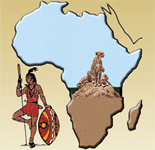Travel Requirements
- A passport and a visa are required. Visas should be obtained in advance, although airport visas are available. Travelers who opt to obtain an airport visa should expect delays upon arrival. There is a fee for such visas, whether obtained in advance or at the airport. Evidence of yellow fever immunization may be requested.
- Travelers may obtain the latest information on visas as well as any additional details regarding entry requirements from any Kenyan Embassy in their country. All luggage is weighed and inspected using X-rays like is done at all International Airports.
- Personal effects, including cameras, binoculars and film are allowed into the country duty free.
- In an effort to prevent international child abduction, many governments have initiated procedures at entry/exit points. These often include requiring documentary evidence of relationship and permission for the child’s travel from the parent(s) or legal guardian not present. Having such documentation on hand, even if not required, may facilitate entry/departure.
- On departure, an international Airport Departure Tax is payable for both domestic and International flights.
- Healthy Travelling
- Immunization against typhoid is highly recommended.
- A yellow fever vaccination certificate is required from travellers over one year of age. Find out from your travel agent if your country is classified as an endemic zone. For such visitors the vaccine is mandatory. Travellers arriving from non-endemic zones should note that vaccination is strongly recommended for travel outside the urban areas, even if an outbreak of the disease has not been reported.
- A cholera vaccination certificate is not mandatory for entry to Kenya. However, cholera is a serious risk in Kenya and precautions should be taken. Talk to your doctor before travelling to Kenya.
- Malaria risk exists all over the country. It is advisable to take anti-malaria tabs before travelling to Kenya and especially the coast or the western part of Kenya. Nairobi is relatively safer when it comes to malaria attacks.
- Water: Bottled water is available and the only guaranteed safe drinking water. Make sure you buy your bottled water from reputable outlets as some of the bottled water is not up to standard. Avoid drinking water straight from the taps. Alternatively boil the water first and cool it for drinking.
- Travelers’ Diarrhea – Food and waterborne diseases are the number one cause of illness in travelers. Travelers’ Diarrhea can be caused by viruses, bacteria, or parasites, which are found throughout the region and can contaminate food or water. Make sure your food and drinking water are safe.
- Make sure you swim in swimming pools whose water has been treated. This will protect you from many water borne diseases like Bilharzia.
- Insect bites – many diseases carried by insects can be prevented by protecting yourself against insect bites. For example carry insect repellants to apply on your body before going out and especially at night.
- Take a kit of sterilized syringe needles for any possible injections needed, as well as drip needles for emergencies.
- If you are on medication, carry all the medicine you require as you may have a problem getting some of the medicines here. Some Chemists also stock generics which may not be as good as the original medicine.
- You could also carry a pack of painkillers, first aid kit and creams for insect bites etc.
- There are good medical facilities in Nairobi and Mombasa.
Traveling Tips
- Always ask for permission before you photograph people or their houses. Some communities might demand a tip after taking a photograph!
- Always change your cash at reputed banks, foreign bureaux or hotels. Never change your money in the black market.
- Don’t expose your cash in public or hand over money to someone especially along the city streets.
- Avoid isolated streets and dark alleys.
- Don’t carry more money than you need when going out.
- Don’t display expensive jewelry.
- Be aware of the possibility of pick-pockets and bag snatchers in crowded areas.
- Keep copies of all your important documents separately from the originals incase of loss.
- While staying at the hotels, keep your money in the safe deposit boxes. Don’t leave valuables in the room.
- Keep your distance from wild animals however harmless they may appear.
- It is advisable to take out emergency medical insurance prior to entering Kenya.
- Tipping is allowed although it is not mandatory. Tipping depend on individuals and services provided.
- Drive on the Left hand side.
- If on a long journey carry a torch and at least 2 spare wheels.
- Never leave your car opened especially in public places. Try to conceal your luggage e.g. by keeping it under the seat.
- Taxis are readily available at the airport for about 15 dollars to the city Centre.
- An airport departure tax of U.S. $20 is levied when leaving the country.
- Kenya is three hours ahead of Greenwich Mean Time +3.
- Always try to have loose cash for small purchases.
- Carry a money belt or pouch under your clothes to keep your money. Do away with wallets and purses. These are usually a target for the pick- pockets and snatchers.
- Plan your itinerary in advance to avoid disappointments e.g. lack of transport or hotel room.
- Always settle on a fare before hiring a taxi to avoid exploitation.
- Reconfirm all airline flights along the way. It is possible to show up for a flight and not have a reservation because you did not reconfirm.
- Don’t ask for directions from strangers idling in the streets. They could be thugs!
- Avoid polishing your shoes along the streets by the so called shoe shiners. Most of them will reap you off.
- The administration is discouraging handing out money to street kids and mothers.
